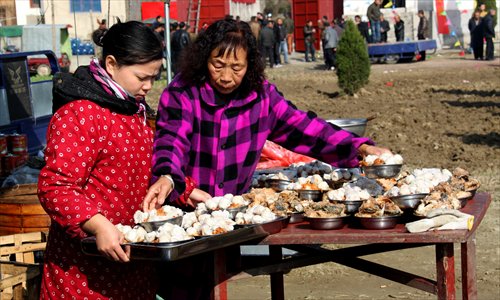HOME >> CHINA
Party poopers
By Li Ruohan Source:Global Times Published: 2015-11-1 20:13:01
Local government bans people from holding lavish banquets

Villagers prepare dishes for a wedding banquet in Xiaogan, Hubei Province on December 6, 2014. Photo: IC
A township which decided to ban locals from holding banquets costing more than 240 yuan ($37) per table has led to people claiming that the fight against official extravagance and corruption should not violate the interests of ordinary people.The rules were adopted by the government of Xuzhuang township, Northwest China's Shaanxi Province, which also set a maximum expenditure of 5 yuan for a pack of cigarettes and limited spending on drinks to 30 yuan per bottle.
Liu Xinzhong, an official from Xuzhuang was quoted by the Chinese Business View newspaper as saying that the rules aim to change the trend towards extravagance in the village as many feel socially pressured to spend large amounts of money on banquets, often more than they can afford.
Wang Yukai, a professor with the Chinese Academy of Governance, called the rules "ridiculous" as the villagers are not embezzling public money, simply spending their own cash.
Echoing Wang, Hu Xingdou, a professor at the Beijing Institute of Technology, told the Global Times that common people have the right to spend their money as they wish as long as they don't break the law.
Unless one is spending the money that belongs to others, one's freedom to consume should not be limited or forbidden, said Hu, adding that consumption should be encouraged.
Just one bowl of soup
Enacted on August 5, 2014, and implemented in 80 percent of villages in Xuzhuang, the rules also stipulate that hosts cannot provide more than a maximum of seven cold dishes, four hot dishes and one bowl of soup for every banquet table, Chinese Business View reported on Wednesday.
And the rule enforced in Hanzhong village in Xuzhuang even bans paid-for performances and fireworks during banquets.
An anonymous village said if anyone violates such rules in Hanzhong, their home will have its water and electricity turned off to stop them from holding the banquet.
Citizens in Tongjiang county, Southwest China's Sichuan Province are only allowed to hold banquets for weddings, funerals and birthdays for people over 70 years old, news portal chinanews.com reported in August.
Some villagers in Xuzhuang have started to hold their banquets in neighboring townships, according to Chinese Business View.
"Totally unnecessary"
Banquets held to celebrate happy events or to honor a deceased family member are tradition in China.
Occasions for banquets have expanded to moving into a new house, being accepted by a college or even getting a new haircut, reports said.
Some hosts even go into debt to hold banquets, fearing that if their banquet is not as good as others, they will be mocked or judged, Chinese Business View reported in April.
This is a habit shaped by an agrarian, collective society, which values "face," said Hu. "But not everyone can afford the cost and curbing extravagance should take the form of a suggestion instead of coercive measures."
Xu Yaotong, a professor at the Chinese Academy of Governance, told the Global Times that most restrictions on lifestyle are imposed on Party members,to prevent corruption, but such restrictions being placed the public is totally unnecessary.
Such bans come amid China's efforts against corruption in the government and Party. About 2,432 officials have been punished for holding banquets with public money since September 2014, People's Daily has reported.
These bans misinterpret the anti-corruption drive, according to Xinhua.
Expenditure on banquets in Xuzhuang, on average, accounts for 10 to 20 percent of a household's annual spending, with the average cost of a banquet coming to around 20,000 yuan, a local official claimed.
The average per capita net income for Xuzhuang's 44,000 residents is 9,467 yuan monthly, according to the local government.
Posted in: Society